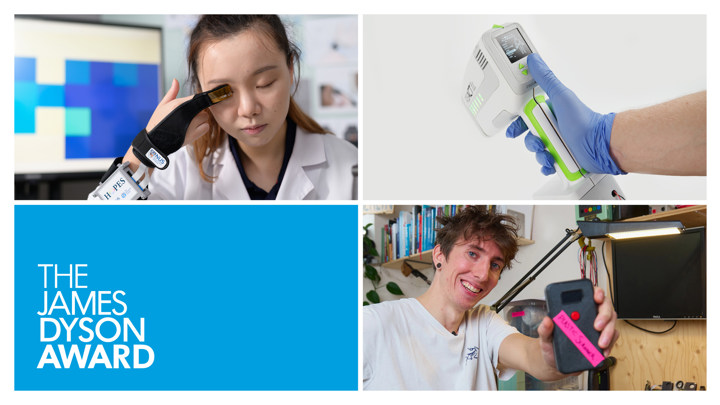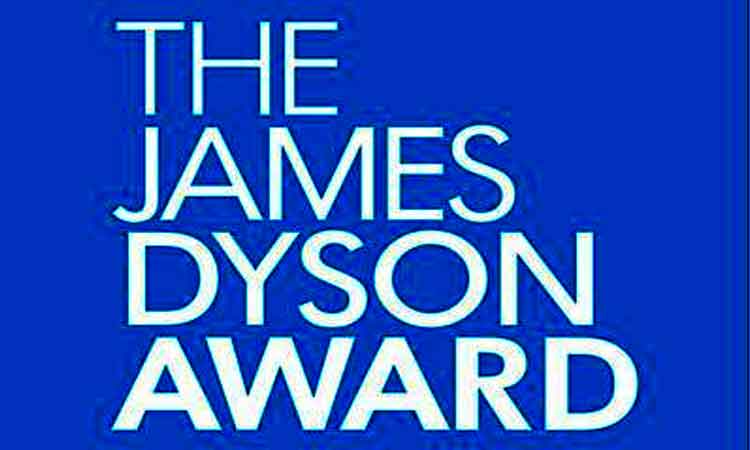
365telugu.com online news,National,april 3th,2022: The James Dyson Award, an annual student design competition run by Dyson’s charity, is now open and accepting submissions from young inventors. After receiving an impressive array of entries in recent years, the Award is increasing its prize money to support the crucial first steps of entrepreneurship. This year’s National winners, to be announced in September, will receive £5,000 (approx. INR 5 lakhs) towards developing their invention. To date the competition has awarded more than 285 inventions with prize money.
Since 2005, the James Dyson Award has challenged entrepreneurial undergraduates and recent graduates of engineering and design, to ‘Design something that solves a problem’. Purposely broad and open- ended, the brief tasks students to take on big global problems. Past winners have found solutions to plastic recycling accessibility, excessive blood loss from knife wounds, and improving at-home medical diagnostics. Sir James Dyson chooses the competition’s global winners; they receive vital funding and
high-profile recognition – key first steps to take their ideas into real life practical application. James Dyson, Founder and Chief Engineer at Dyson, said: “For me the importance of the James Dyson Award is to solve a problem intelligently – for young inventors to question things, challenge things.
I truly believe young people want to change the world and in that they should be encouraged. The future is their world. The Award gives them the confidence and a platform to pursue their solutions. In fact, 70% of our past international winners are following up and commercialising their inventions. To future entrants, I look forward to reviewing your radical and game-changing ideas. Good luck!”

What can winners expect?
- Prize money. National winners receive £5,000 (approx. INR 5 lakhs) and global winners up to £30,000 (approx. INR 30 lakhs) to put towards the next phase of their invention’s development.
- Media attention. Winners receive interest from the media, public and industry professionals when the James Dyson Award announces its winners, opening doors and catalysing conversations to support product development and networking.
- Past winner support. This year the Award launched a winners’ network for those commercialising their inventions. Events and networking opportunities for past winners of the Award to connect, share experiences and consider inter-winner mentorship. The past two years saw a record-breaking number of entries. Recognising the role that engineers and scientists play in our future, James Dyson chose three global winners for the first time in 2021, each receiving £30,000 in prize money.This year, there will be global prizes available. But first, each participating country and region will award a National winner (£5,000) and two National runners-up. The National winners are chosen by an external panel in collaboration with a Dyson engineer. In 2022, the Award launches for the first time in Thailand and Turkey.
Those that win a National accolade proceed to the International shortlist and awarding stages, where James Dyson selects his global winners.
What makes a good entry? The best inventions are often the simplest, providing clear and intelligent solutions to real-world problems.
Last year’s National winner from India was Deval Karia, the inventor of LifeBox. The project LifeBox was developed with a vision to explore drones as a transport channel for organs. Conceptually, multiple ideas were brainstormed, leading to development of several prototypes and a novel
cooling system that allows for significant reduction in weight and power requirement. Fluid delivery and cooling sub-systems were iteratively improved via experiments.

Deval Karia, the inventor of LifeBox, said: “India has an abysmal rate of 200 heart transplants annually, despite a staggering 50,000 people in need. Institutional factors aside, the inability to move hearts from a donor to the recipient is a major hindrance to bridging this gap.” “The project has its genesis in a course taught by Prof. B. Gurumoorthy, Prof. A. Ghosal at CPDM,
with a vision to explore drones for organ transportation. However, we soon realized that without active preservation techniques, drones will not do much to improve the rate of heart transplants in India. This led to a shift in focus: A portable system that can extend the out-of-body viable time of
the heart.”
Get to know what Dyson engineers are looking for in a James Dyson Award submission. Hear from long standing James Dyson Award judge, Peter Gammack, VP of New Product Innovation at Dyson, on the Dyson Newsroom here.Boosting opportunities The Award has given young inventors international media exposure, which has opened further investment and opportunities for them to develop their ideas. The 2014 International winner, mOm incubators, provides more flexible options for neonatal care; after successfully passing all external testing, it’s now used in three UK NHS trusts and has so far supported more than 20 children’s lives. Ambitious plans are now in place for mOm to help increase access to neonatal care around the world. In 2017, US National runner-up SoaPen,
a colourful soap pen encouraging safe handwashing, commercialised their invention and were listed in the prestigious Forbes 30 Under 30 List.

SoaPen now ships its expanding product portfolio across America, most recently creating a hand sanitizer to meet demand during the Covid-19 pandemic. 2011’s Singaporean runner-up, Rabbit Ray, is used by 44 hospitals across 23 countries. It’s a communications tool for hospital staff to use when explaining medical procedures to children. Its inventor, Esther Wang, has since founded an award-winning health-education company, Joytingle, and her Rabbit Ray invention supports medical procedure communications from vaccinations to chemotherapy. Stay up to date with the James Dyson Award.
Website: https://www.jamesdysonaward.org/
Instagram: @jamesdysonaward
Newsroom: https://www.dyson.co.uk/newsroom/overview/news/march-2022/2022-james-dyson-award-
open-for-entries

